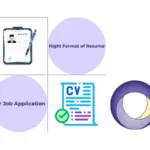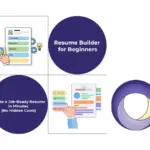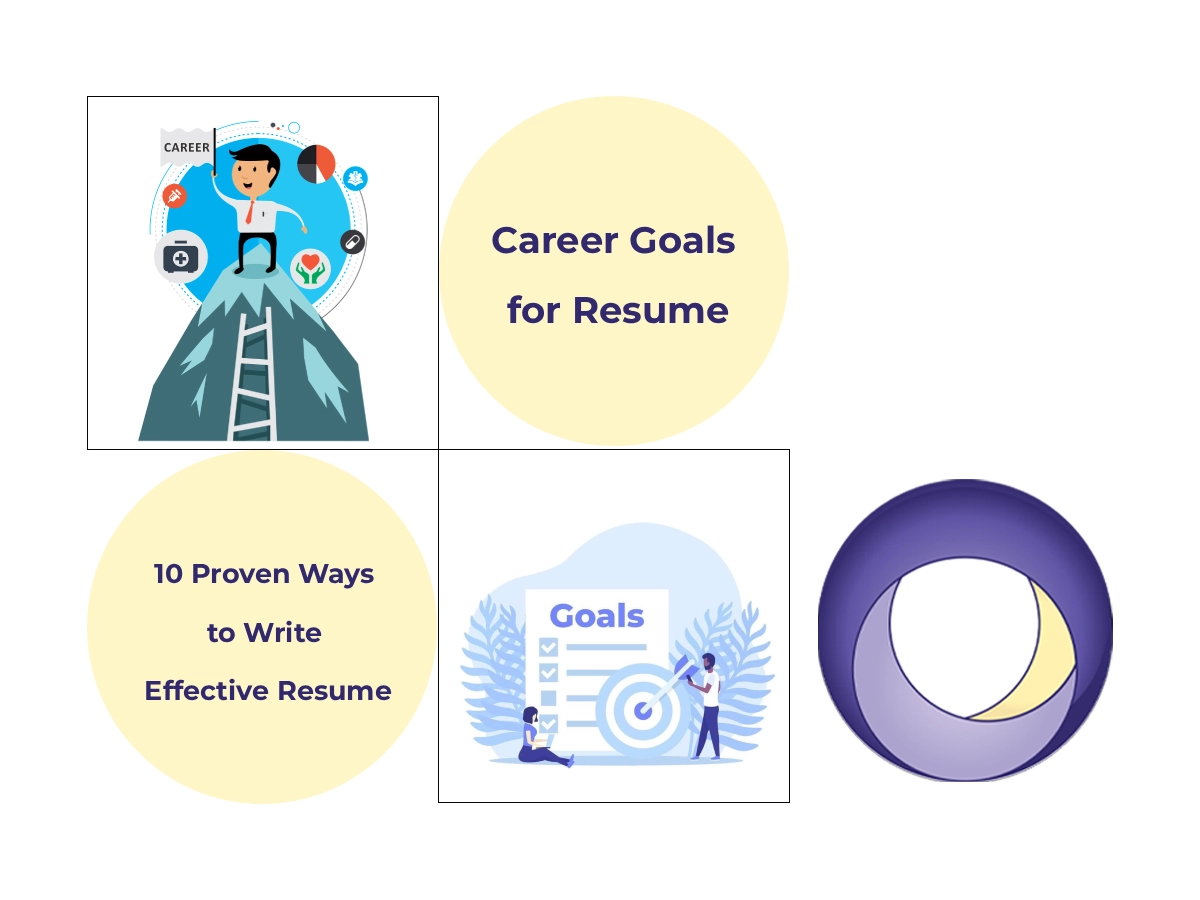
10 Proven Ways to Write Effective Career Goals for Resume
Using the right career goals for resume isn’t about sounding impressive; it’s about sounding relevant. A good one takes attention in a split second, showing employers that you know what you want and that your path fits theirs. In competitive job markets like the UAE or Saudi Arabia, this short section can distinguish between being skimmed over and being shortlisted.
- What Are Career Goals for Resume?
- Why Career Goals for Resume Matter More Than Ever?
- When to Use a Career Objective (and When Not To)
- Core Components of an Effective Career Goal
- How to Align Your Career Goal with the Job Description
- Examples of Career Goals for Resume Statements
- 1. Entry-Level Example
- 2. Career Change Example
- 3. Specific Role Example
- 4. Experienced Professional Example
- Personal Career Goals for Resume: Reflecting Valid Motivation
- Use Resume AI Tools Wisely
- Customise Career Goals for a Resume in Different Industries
- 1. Career Goals for IT & Software Jobs
- 2. Career Goals for Marketing Professionals
- 3. Career Goals for Finance Professionals
- 4. Career Goals for Sales & Business Development
- 5. Career Goals for Human Resources Professionals
- 6. Career Goals for Design & Creative Roles
- 7. Career Goals for Administrative & Office Support
- How to Personalise Career Goals for Resume?
- 1. Use Natural Phrasing
- 3. Write for Each Company
- 4. Mirror Company Values
- 5. Match Regional Context (Especially in MENA)
- 6. Don’t Be Afraid of Small Imperfections
- 7. Add a Tiny Hint of Your Personality
- Employer Perspective: What Makes a Career Goals for Resume Stand Out
- Testing, Refining, and Optimising Your Career Goals
- 1. Start with Real Human Feedback
- 2. Use Job Description Matching
- 3. Check How It Sounds Out Loud
- 4. Test for ATS Compatibility
- 5. Learn from Employer Reactions
- 6. Revisit and Rewrite Regularly
- 7. Add Metrics or Impact (When Possible)
- Templates for Different Career Stages
- 1. Entry-Level Candidates
- 2. Mid-Career Professionals
- 3. Experienced Professionals & Managers
- 4. Career Changers
- 5. Freelancers or Remote Professionals
- How to Check if Your Career Goals for Resume Are Working?
- Bonus: The “FormuCV Formula” for Career Goals
- Advanced Optimisation & Final Checklist for Perfecting Your Career Goal
- 1. Think Like SEO, But for Resumes
- 2. Regional Adaptation: MENA vs. International Job Markets
- 3. Incorporate Micro-Differentiators
- 4. The Power of Tone and Rhythm
- 5. Align with Employer Language
- 6. When to Skip the Career Goal Entirely
- 7. Use FormuCV’s Real-Time Preview to Improve Tone
- How to Know When It’s Done
- 8. The 15-Word Test
- 9. Add Your Career Goal to LinkedIn and Online Profiles
- Final Section: The Career Goals for Resume Checklist
- Final Thoughts
When reviewing resumes for a fintech startup in Dubai, one thing stood out: the candidates who wrote specific, value-driven career goals were almost always called back first. Their resumes didn’t just list experiences; they revealed direction.
What Are Career Goals for Resume?
Career goals for resume are short, focused statements, usually one or two sentences, summarising your professional aspirations and how they align with the job you’re applying for.

Think of them as your north star in one line: a mini pitch that tells employers who you are, what you’re aiming for, and how hiring you helps their company move forward.
They’re not the same as long-term career plans. While a personal vision might stretch ten years into the future (“I want to become a CTO”), your resume goal should zoom in on the immediate next role, something tangible, like “seeking a senior backend developer position at a growing SaaS company where I can build scalable APIs and mentor junior engineers.”
Why Career Goals for Resume Matter More Than Ever?
Today’s hiring process moves fast. Employers spend, on average, 7 seconds scanning a resume. Those seconds determine whether they keep reading or move on. A clear career goal acts as a signpost; it tells them instantly, “Yes, this person knows what they want and fits this position.”
There’s also an ATS (Applicant Tracking System) angle. Tools like FormuCV, optimising resumes using smart keyword alignment, show how much keyword relevance matters. A targeted goal improves your match score, increasing the chances that a human will see your resume.
When to Use a Career Objective (and When Not To)
Career goals for resume aren’t mandatory on every resume. It’s most effective in these cases:
- Entry-level professionals: You may not have years of experience, but a clear objective shows enthusiasm and direction.
- Career changers: It connects your transferable skills to your new target role.
- Applicants for specific roles or companies: Key goals signal intent, not desperation.
If you’re a senior professional with years of experience, you can replace the “Career Objective” with a “Professional Summary” that subtly integrates your career goals. That said, many career goals for resume for experienced candidates still work, especially if you’re repositioning yourself for leadership roles or pivoting industries.
Core Components of an Effective Career Goal
Writing an effective career goal is part art, part precision. Here’s what matters most:
- Concise: Keep it short: one to two lines. Clarity wins over cleverness.
- Specificity: Mention the job title and company when possible.
- Value Proposition: Focus on how your skills solve problems for the company.
- Keywords: Use relevant terms from the job description to align with ATS.
- Strong Attributes: Start with your defining traits: “results-driven,” “organised,” “collaborative,” “analytical.”
How to Align Your Career Goal with the Job Description
Let’s say you’re applying for a Software Engineer role at Careem. The job description highlights “API development,” “team collaboration,” and “Agile methodology.”
An effective goal might read:
“Driven software engineer seeking to contribute to Careem’s product growth by building scalable APIs and collaborating in Agile teams to enhance user experience.”
Notice how it reflects the company’s priorities rather than generic ambition. It’s less about what you want and more about what you can offer.
Compare that to a weak version:
“Looking for a software engineer role to grow my skills and learn new technologies.”
That one focuses entirely on the candidate’s needs, not the employer’s.
Examples of Career Goals for Resume Statements
Let’s talk about practical, context-rich examples for different career stages.
1. Entry-Level Example
“Entry-level professional with excellent communication skills seeking an insurance sales position to build lasting client relationships and support effective policy delivery.”
Here, “effective policy delivery” mirrors the industry’s efficiency and service quality values.
2. Career Change Example
“Accomplished marketing leader seeking a nonprofit opportunity to apply data-driven storytelling and strategic partnerships to drive community engagement.”
The key? It bridges past achievements with new passion, without sounding like a total reset.
3. Specific Role Example
“Highly driven business graduate seeking a finance analyst role to leverage market analytics and improve organisational profitability.”
Simple, measurable, and aligned with business impact.
4. Experienced Professional Example
“Results-oriented operations manager with 10+ years of experience in logistics and process optimisation, aiming to lead efficiency initiatives that enhance profitability and customer satisfaction.”
It is a classic career goals for resume for experienced professionals. It signals leadership and outcome orientation.
Personal Career Goals for Resume: Reflecting Valid Motivation
A well-written career goal doesn’t just impress; it reveals who you are. Authenticity matters. If you say you’re “passionate about sustainable design,” ensure that passion shows in your portfolio or volunteer work.
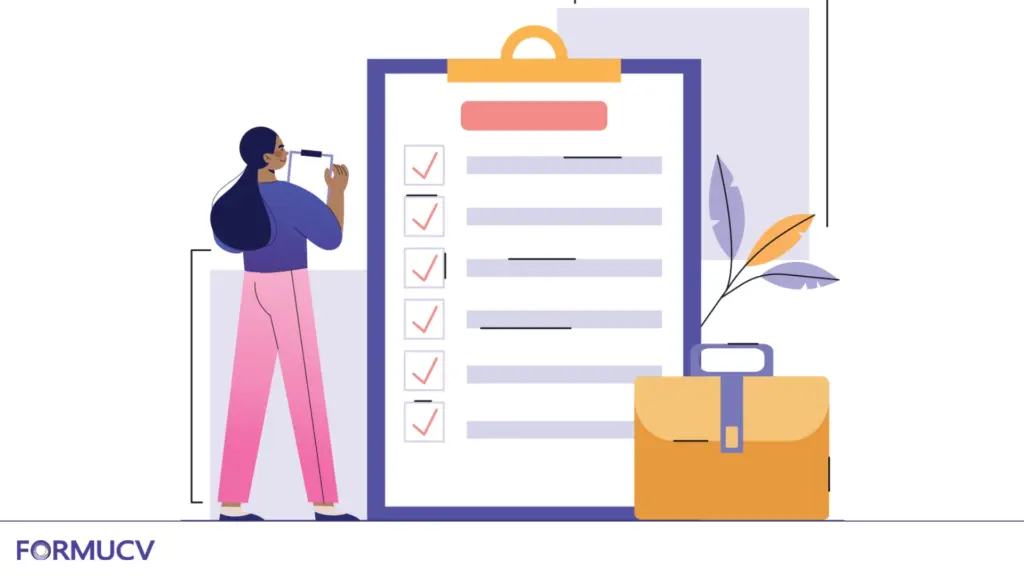
Employers can sense when statements are copied from a template. I once saw five resumes, “seeking a challenging position where I can utilise my skills and grow.” They all blurred into one. The one candidate who wrote, “Driven by curiosity for how people interact with technology, I aim to design interfaces that make daily apps feel invisible,” got the interview.
That’s the power of personal career goals for a resume; they show humanity and purpose, but avoid the mistakes below:
- Being too Misty: Avoid lines like “seeking an opportunity to grow.” Everyone wants that.
- Overly ambitious tone: Don’t say “to become CEO in five years.” Keep it believable.
- Neglecting the employer’s perspective: Always balance “I want” with “I can contribute.”
- Copy-pasting templates: Use them for structure, but always customise.
- Ignoring keywords: Especially fatal in ATS-filtered systems.
Use Resume AI Tools Wisely
Platforms like FormuCV allow you to paste a job description and instantly see how your resume matches. That’s a goldmine for improving your career goals. You’ll see which words appear most often; those are your cue for what to include naturally.
For instance, if the job description emphasises “data-driven decision-making,” your goal could include “data-driven strategies” or “analytical insights.” The AI doesn’t write for you; it helps you think like an employer.
Customise Career Goals for a Resume in Different Industries
One of job seekers’ most significant mistakes is using the same career goal for every application. Hiring managers can spot a generic statement immediately; it feels flat, disconnected, and lazy. The truth is, each industry speaks its own language.
Your career goal must echo that tone, using keywords, priorities, and a style that makes sense in that world.
Let’s say how to write your career goals across key professional fields, drawing from honest employer feedback and examples from the MENA region.
1. Career Goals for IT & Software Jobs
In tech, employers value problem-solving, collaboration, and measurable impact. Building, optimising, or scaling is a good career goal.
Example (Entry-Level Developer):
“Computer science graduate passionate about clean code and user experience, seeking a junior web developer position to build fast, responsive interfaces for growing digital products.”
Example (Experienced Developer):
“Senior software engineer with 7+ years of experience in backend architecture and API development, aiming to enhance system scalability and performance at a data-driven organisation.”
Employer Insight:
According to UAE tech employers, candidates who mention specific technologies (like Python, React, or AWS) in their goals immediately stand out. It shows practical readiness, not just theoretical interest.
2. Career Goals for Marketing Professionals
Marketing roles value creativity, data insight, and audience understanding. Your career goal should balance the creative and the analytical.
Example (Digital Marketing Specialist):
“Strategic digital marketer eager to craft data-backed campaigns that drive engagement and strengthen brand loyalty in competitive markets.”
Example (Marketing Manager):
“Results-driven marketing manager with a record of boosting campaign ROI by 25%, seeking to lead brand growth initiatives in the GCC market through innovative digital storytelling.”
Employers in Dubai often scan for terms like ROI, conversion rate, social engagement, or brand positioning. Weave one or two of these naturally into your goal.
3. Career Goals for Finance Professionals
Financial employers look for precision, integrity, and a results-oriented mindset. Keep your wording disciplined, number-driven, and confident.
Example (Entry-Level Analyst):
“Analytical finance graduate seeking an entry-level analyst role to support data-driven investment decisions and contribute to portfolio performance.”
Example (Senior Finance Manager):
“Seasoned finance manager with 10 years of experience in budgeting and risk analysis, aiming to optimise financial strategies and drive sustainable profitability.”
When we spoke to a CFO at a logistics firm in Sharjah, he mentioned he often skips resumes that sound too “textbook.” He looks for candidates who sound practical, someone who’s handled numbers, not just studied them.
4. Career Goals for Sales & Business Development
Employers want to see drive, relationship-building, and measurable success. Confidence is key, but avoid sounding arrogant.
Example (Sales Representative):
“Energetic sales professional eager to grow revenue and strengthen client relationships by delivering solutions that meet evolving business needs.”
Example (Business Development Manager):
“Strategic business developer with 8+ years of experience in B2B partnerships, seeking to expand market presence and increase client retention through growth strategies.”
In GCC markets, sales employers love seeing mention of client retention, market expansion, or pipeline growth. Those are the metrics that get attention.
5. Career Goals for Human Resources Professionals
HR career goals should emphasise people, processes, and culture. Avoid corporate buzzwords like “synergy” or “dynamic environment”; they dilute sincerity.
Example (HR Officer):
“Empathetic HR professional aiming to enhance employee engagement and streamline recruitment processes within a value-driven organisation.”
Example (HR Director):
“People-focused HR leader with 12+ years of experience designing talent strategies that foster inclusion, performance, and retention.”
If you’ve used tools like FormuCV to analyse job descriptions, pay attention to how companies describe their people, whether it’s “talent,” “employees,” or “team members.” Match their tone subtly in your statement.
6. Career Goals for Design & Creative Roles
Creative roles reward individuality and voice. Your career goal should sound inspired, not mechanical.
Example (Graphic Designer):
“Creative designer passionate about visual storytelling, seeking to craft engaging brand visuals that connect emotionally and drive recognition.”
Example (UX Designer):
“Curious UX designer focused on building intuitive digital experiences that simplify life and strengthen trust between users and products.”
When reviewing design resumes, we often pause on statements that feel human. One candidate wrote, “I love the moment when a design clicks for someone who didn’t expect it to.” It wasn’t perfect, but it was memorable.
7. Career Goals for Administrative & Office Support
These roles require clarity, efficiency, and dependability. Your goal should highlight organisation and reliability.
Example:
“Organised administrative professional seeking to support operational efficiency and seamless office coordination in a fast-paced business environment.”
Simple, crisp, and precisely what hiring managers in admin teams look for.
How to Personalise Career Goals for Resume?
Many job seekers struggle with balance; they want to sound professional but become robotic. Here’s how to stay human and authentic.

1. Use Natural Phrasing
Avoid sentences that sound like a corporate generator wrote them.
Say: “I’m eager to contribute my logistics experience to help streamline supply operations.”
Not: “To obtain a challenging position in a reputable company to utilise my potential.”
Don’t write if you wouldn’t say it in real life.
2. Reflect Your Motivation, Not Just Skills
Employers want a glimpse of why you do what you do.
Example: “Motivated by the challenge of solving complex technical problems, I aim to build systems that make digital life easier.”
That’s honest, and it reads like a real person wrote it.
3. Write for Each Company
If you’re applying to Emirates Airlines, show alignment:
“Customer-focused professional seeking to contribute to Emirates’ world-class service standards through consistent performance and teamwork.”
This extra 10 seconds of personalisation signals effort. Employers notice.
4. Mirror Company Values
Before writing your goal, scan the company’s “About Us” or “Careers” page.
Do they emphasise innovation, collaboration, or sustainability? Use those words, but sparingly. You’re not mirroring for SEO; you’re aligning tone.
5. Match Regional Context (Especially in MENA)
In the MENA market, companies often value loyalty and a long-term growth mindset.
Statements like “looking to grow within a company that values professional development and innovation” fit the regional hiring culture well.
FormuCV’s AI-powered analysis can even suggest localised phrasing based on top UAE job descriptions, helping your goal match the tone of real employers.
6. Don’t Be Afraid of Small Imperfections
Perfectly polished writing often sounds automated. Allow natural rhythm. For instance, use contractions, I’ve, I’m, and I’d, and vary your sentence length.
Employers read dozens of identical sentences daily; authenticity catches their eye faster than perfection.
7. Add a Tiny Hint of Your Personality
It doesn’t mean adding jokes or life stories, just subtle clues about what drives you.
Example: “Driven by curiosity for emerging tech, I’m eager to join a team that values experimentation and learning.”
It’s professional but warm.
Employer Perspective: What Makes a Career Goals for Resume Stand Out
To get insider clarity, I spoke with three hiring professionals, two from Dubai and one from Riyadh. Here’s what they consistently look for in a good career goal:
- Clarity of intent: “If I can’t tell what job you’re applying for in one line, I move on.”
- Company alignment: “Mentioning my company’s name shows effort. Even if everything else is average, that catches my eye.”
- Tone of confidence: “Not arrogant, but confident. Words like driven, proactive, and focused work well.”
- Relevance: “Don’t talk about skills that don’t relate. A finance resume shouldn’t start with creativity.”
- Brevity: “Two sentences max. Anything longer feels like a cover letter.”
Testing, Refining, and Optimising Your Career Goals
You’ve written a career goal that sounds strong. But how do you know it actually works?
Even a perfectly worded sentence can fall flat if it doesn’t resonate with employers or, worse, if it gets filtered out by an ATS before anyone reads it.
The best resumes are tested and tuned, just like good products. Let’s walk through how to do that using a mix of human feedback, simple tech tools, and a bit of personal awareness.
1. Start with Real Human Feedback
Before sending your resume, share it with someone with hiring experience, not just a friend or family member. Ask them to read your career goal and answer three questions:
- Can you tell what job I’m applying for?
- Does this goal sound confident and specific?
- Would you want to read the rest of my resume?
If the answer to these is “not really,” your goal needs tweaking.
You can also use FormuCV’s AI Review to get structured feedback. Based on the job description you’re targeting, it highlights vague phrasing, missing keywords, and tone mismatches.
2. Use Job Description Matching
One of the most practical features of FormuCV, and similar AI-powered tools, is job match scoring.
When you paste a job description, the AI compares your resume (including your career goal) with the company’s language and gives a relevance score.
If your goal includes the right action verbs and skills (like “coordinate,” “optimise,” or “analyse”), your match score rises.
This process helps ensure your goal doesn’t just sound good but also aligns with how employers actually search within ATS platforms.
Example:
Let’s say you apply for a job posting that says:
“Looking for a results-driven sales executive with strong negotiation skills and experience in B2B partnerships.”
A weak career goal might say:
“Motivated professional seeking a sales role to expand my skills.”
A stronger, keyword-aligned version:
“Results-driven sales executive with proven negotiation and B2B relationship-building experience, seeking to drive growth through strategic partnerships.”
Notice the echoing of key phrases from the job description, such as “results-driven,” “negotiation,” and “B2B partnerships.” That’s precisely how ATS algorithms flag relevance.
3. Check How It Sounds Out Loud
Here’s a trick few people use: read your career goal aloud.
It’ll read that way if it feels stiff or unnatural.
A goal that rolls off the tongue smoothly usually reads better to an employer’s eye. You should sound confident, not rehearsed. If you stumble while reading it, simplify your sentence structure. Employers prefer direct language over perfect phrasing.
4. Test for ATS Compatibility
Most companies in MENA use ATS platforms like Greenhouse, Oracle Taleo, or Zoho Recruit.
These systems scan your resume for specific keywords, then rank it based on relevance.
To make sure your career goal isn’t costing you points:
- Avoid fancy fonts or tables around the text (ATS might skip it).
- Keep it plain text at the top of your resume.
- Include 2–3 role-specific keywords naturally.
💡 FormuCV’s Smart Parsing Tool automatically checks these formatting details when you upload or generate your resume, so you don’t have to guess whether your text will display correctly.
5. Learn from Employer Reactions
I recently spoke with a hiring manager at a logistics firm in Abu Dhabi who said something that stuck with me:
“I don’t care how fancy your resume looks if the first line doesn’t tell me where you’re going.”
That’s the heart of it. Employers want direction. They want to see that you’ve chosen their company deliberately, not spraying applications everywhere.
Here’s what real employers notice (and what turns them off):
| Employer Loves | Employer Skips |
| Clear job title | Generic “seeking a challenging opportunity” |
| Self-centred focus (“looking to grow my skills”) | Copy-pasted template text |
| Specific value (e.g., “boosting efficiency”) | Personally tone |
| Measurable outcomes | Fluffy adjectives (“dynamic,” “hardworking”) |
| Personaly tone | Buzzword overload |
If you can tick even three of those “love” boxes, your career goal is already above average.
6. Revisit and Rewrite Regularly
Your resume and goal aren’t static. Rewrite them every six months (or every major role change).
Update your target industry, company type, and skill focus.
For example:
- A marketing associate who shifts to digital analytics should evolve from “building brand engagement” to “driving data-informed campaign strategies.”
- A developer moving into team leadership can reframe “writing clean code” into “mentoring developers and improving delivery workflows.”
Think of it like personal SEO, optimising your profile for how the market sees you today.
7. Add Metrics or Impact (When Possible)
If you’re experienced, numbers speak louder than adjectives.
Turn vague impact into measurable results.
Instead of:
“Looking to lead operations and improve performance.”
Try:
“Operations leader seeking to streamline workflows and cut delivery time by 20% through data-driven process improvements.”
Even if your figures are approximate, they add credibility. Employers see hundreds of statements each week; quantified ones stand out instantly.
Templates for Different Career Stages
Let’s make it practical. Below are ready-to-use examples you can adapt for your own resume. They include both general and specialised options.
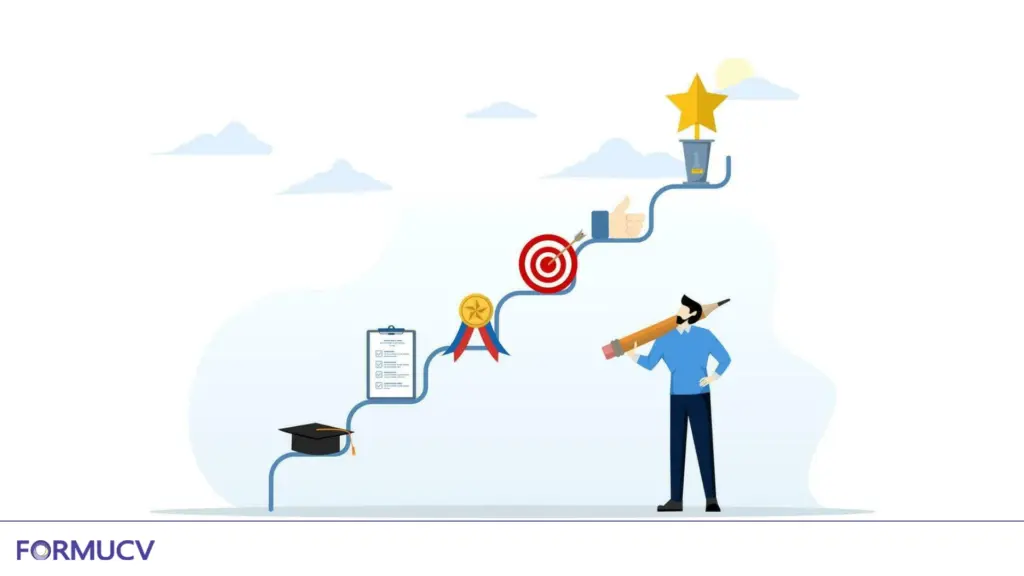
1. Entry-Level Candidates
You may lack experience, but you can highlight learning activity and motivation.
General Example:
“Recent graduate in business administration seeking an entry-level role to contribute analytical and organisational skills to a growth-driven company.”
IT Example:
“Computer science graduate passionate about web development, eager to contribute to user-focused software solutions in a collaborative tech team.”
Hospitality Example:
“Enthusiastic hospitality graduate aiming to deliver exceptional guest experiences and uphold brand standards in a world-class environment.”
2. Mid-Career Professionals
At this level, your goal should highlight specialisation and consistency.
Finance Example:
“Detail-oriented finance analyst with five years of experience in budget control and cost reduction, seeking to optimise financial performance for a multinational firm.”
Marketing Example:
“Creative marketing strategist skilled in campaign analytics and content development, aiming to drive engagement and strengthen brand positioning in GCC markets.”
3. Experienced Professionals & Managers
Use results-oriented language that signals leadership and measurable outcomes.
Engineering Example:
“Mechanical engineer with 12 years of experience in plant operations, seeking to lead efficiency improvement initiatives that boost productivity and reduce costs.”
HR Example:
“Seasoned HR leader focused on developing people-first cultures and enhancing talent retention through strategic performance programs.”
4. Career Changers
Show how your old skills transfer seamlessly into the new field.
Example:
“Experienced project coordinator transitioning into UX design, leveraging strong stakeholder management and creative problem-solving skills to deliver user-centred experiences.”
Employers respect clarity. You’re telling them: “Yes, I’m changing direction, but I’ve thought it through.”
5. Freelancers or Remote Professionals
Your goal should be communicating adaptability and value delivery if you work across projects or clients.
Example:
“Freelance digital content creator helping startups grow through strategic storytelling and SEO-driven design, seeking to collaborate with innovative brands remotely.”
In remote-first environments, this directness is appreciated.
How to Check if Your Career Goals for Resume Are Working?
Here’s a simple 3-step litmus test:
- Relevance Test: Does it clearly target the job title and field?
- Impact Test: Does it show how you add value, not just what you want?
- Authenticity Test: Does it sound like something you’d say in person?
If you can say yes to all three, you’re already in the top 20% of applicants.
Bonus: The “FormuCV Formula” for Career Goals
Here’s a practical structure inspired by the resume-building logic used in FormuCV’s guided editor:
[Strong trait] + [Experience/role] + [Core skill/impact area] + [Value contribution for company].
Example:
“Results-oriented HR professional with 6+ years of experience in talent acquisition, seeking to strengthen employee engagement and retention within a people-driven organisation.”
That’s 25 words, and every one of them earns its place.
Advanced Optimisation & Final Checklist for Perfecting Your Career Goal
Writing your career goal is one thing.
Making it unforgettable, for both employers and algorithms, is another.
At this stage, you’ve already crafted a strong statement. We’ll refine it through SEO-style optimisation, cultural tone awareness (especially for the MENA job market), and employer-tested polish.
1. Think Like SEO, But for Resumes
Your resume is your website, and your career goal is its homepage headline.
Like SEO, you need to target keywords that match your “searchers”, the employers.
How It Works:
- Every job posting contains “ranking terms”, the skills and qualities the employer repeats.
- ATS systems (Applicant Tracking Systems) scan for those terms.
- If your resume includes them naturally, it rises to the top.
For example, if you’re applying for a data analyst role, the description may repeat words like:
- “data visualisation”
- “SQL”
- “KPI analysis”
- “reporting accuracy”
A goal like this integrates those naturally:
“Detail-oriented data analyst skilled in SQL and data visualisation, aiming to support business KPIs through accurate, actionable insights.”
It’s keyword-aligned and still sounds human.
Avoid Keyword Stuffing
Just like SEO writing, forcing keywords feels robotic.
Bad version:
“Data analyst with data visualisation, SQL, analytics, and KPI experience in data.”
That’s keyword soup. Employers can smell it a mile away. Use keywords only if they add clarity or precision.
2. Regional Adaptation: MENA vs. International Job Markets
The tone and structure of your career goal can subtly shift depending on where you’re applying.
Let’s look at the differences.
A. UAE and MENA Employers
In Gulf markets (UAE, Saudi Arabia, Egypt, Qatar), employers often appreciate:
- A respectful, formal tone.
- Explicit mention of professional loyalty or long-term growth.
- Alignment with company vision or cultural values.
Example (MENA Style):
“Dedicated project coordinator seeking to contribute to an innovative UAE-based company by improving process efficiency and supporting long-term organisational goals.”
There’s an emphasis on contribution, growth, and stability, qualities that resonate deeply in MENA’s relationship-driven business culture.
B. Global or Western Employers
In global markets (Europe, North America, remote-first startups), tone tends to be:
- Direct and concise.
- Focused on impact and independence.
- Less formal, more dynamic.
Example (Global Style):
“Project coordinator focused on improving workflow efficiency and team collaboration to deliver faster, data-informed results.”
The focus shifts to results and autonomy, reflecting global hiring priorities.
3. Incorporate Micro-Differentiators
Employers read hundreds of resumes weekly. To sound professional yet distinct, use subtle “hooks,” microphrases that show self-awareness or initiative.
Micro Differentiators Examples:
- “Driven by curiosity…”
- “Eager to simplify complex processes…”
- “Motivated by data that drives change…”
- “Passionate about creating clarity through structure…”
These are not clichés; they express a mindset.
For instance:
“Driven by curiosity for emerging fintech trends, I aim to develop scalable systems that enhance digital payment experiences.”
You sound both technical and human. That’s the sweet spot.
4. The Power of Tone and Rhythm
A well-written goal sounds different when read aloud. It has rhythm, pauses, emphasis, and natural flow.
Compare these two:
Incorrect: “To obtain a position in a reputable organisation where I can utilise my skills, gain experience, and grow professionally.”
Correct: “Motivated operations assistant aiming to streamline logistics and contribute to smooth, reliable daily operations.”
The second one moves. It feels alive. It’s written with action verbs, not empty aspiration.
5. Align with Employer Language
A subtle but powerful trick: mirror the company’s own wording.
If a company describes itself as “customer-obsessed,” use that.
If they emphasise “innovation” or “community,” reflect it.
Example:
Company mission statement:
“We innovate sustainable solutions that empower communities.”
Your adapted goal:
“Passionate about sustainable innovation, I aim to contribute to community-focused projects that drive measurable impact.”
It’s not copying, it’s connection.
6. When to Skip the Career Goal Entirely
Sometimes, not including a career goal is the more brilliant move.
If you’re an established professional with a clear job title and consistent experience, your Professional Summary might carry more weight.
Example (Professional Summary replacing Career Goal):
“Senior digital marketing strategist with 12+ years of experience leading global campaigns across fintech and SaaS industries. Skilled in SEO, brand storytelling, and cross-channel analytics.”
Here, the direction is clear without an explicit “goal” line.
That said, for most job seekers in the MENA region, especially early and mid-career candidates, a well-written goal still offers strong differentiation.
7. Use FormuCV’s Real-Time Preview to Improve Tone
This is where modern resume tools like FormuCV really shine.
FormuCV lets you see your resume in real-time while testing how different versions of your career goal look across templates.
You can switch between templates, adjust tone, or experiment with layout, then instantly download a PDF version that keeps your formatting intact.
That visual feedback loop is invaluable. It helps you spot awkward phrasing, long lines, or word breaks that could hurt first impressions.
Example of iteration:
- First version: “Ambitious data scientist eager to apply Python and AI to solve real-world challenges.”
- Improved version: “Data scientist passionate about solving real-world challenges through Python automation and AI-driven insights.”
The difference? Clarity and flow. You feel the rhythm when you read it out loud.
How to Know When It’s Done
You may be tempted to overedit your goal. Here’s a framework for knowing when to stop:
| Checkpoint | Question | Pass Mark |
| Clarity | Does it clearly define your desired role? | Is it undertwo2 lines or ~30 words? |
| Relevance | Does it use job-specific or industry keywords? | Appears naturally |
| Brevity | Is it under two lines or ~30 words? | Quick to read |
| Tone | Does it sound confident, not robotic? | Feels human |
| Value | Does it show what you bring, not just what you want? | Contributes something specific |
| Authenticity | Would you say it the same way in an interview? | Feels like “you” |
If you pass 5 out of 6, stop editing.
Perfect resumes are often less natural than good ones.
8. The 15-Word Test
Try condensing your goal into 15 words or fewer.
It forces focus and clarity.
Example:
“Results-driven HR specialist improving hiring efficiency and engagement through data-backed strategies.” (15 words)
If it still sounds complete, you’ve nailed it.
9. Add Your Career Goal to LinkedIn and Online Profiles
Your resume goal shouldn’t live in isolation.
Reuse a refined version in your LinkedIn headline or portfolio bio for brand consistency.
Example:
- Resume: “Marketing strategist passionate about driving growth through data-led storytelling.”
- LinkedIn Headline: “Marketing Strategist | Storytelling through Data | Driving Measurable Growth”
Consistency builds trust and SEO alignment, both online and offline. To learn more about this topic, follow us on FormuCV LinkedIn.
Final Section: The Career Goals for Resume Checklist
Consider a short but powerful checklist before you “Submit” your application.
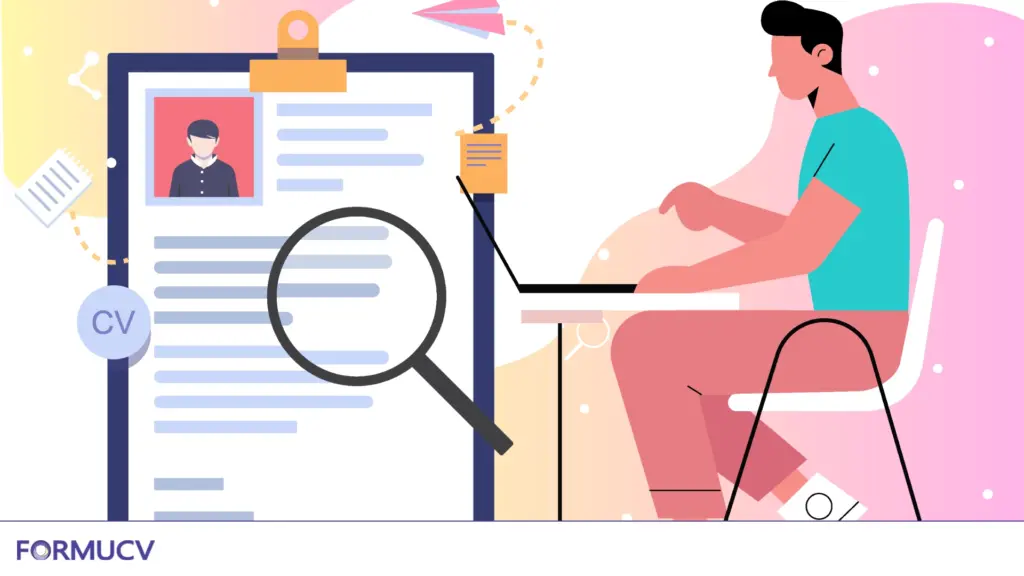
- Clarity: Your statement clearly states your intended role, industry, or area of expertise.
- Specificity: It names the position or skill focus that aligns with the employer’s job post.
- Relevance: You’ve woven in 2–3 natural keywords from the job description.
- Value Proposition: It answers: “What’s in it for the company?” not just “What’s in it for me?”
- Personality: A subtle, genuine touch that reflects who you are, without being over the top.
- Brevity: Under two sentences, ideally 25–35 words.
- Alignment: Matches the tone and goals of the company (especially in the MENA region).
- ATS-Ready: Plain text, no formatting issues, easy to parse.
- Visual Test: Looks balanced at the top of your resume (no text wall).
- Final Read-Aloud Check: It sounds natural, not rehearsed or stiff.
Final Thoughts
Strong career goals for resumes are more than just a few lines; they’re essential. They tell the employer where you’re headed and why they should join you.
When written with sincerity, clarity, and focus, it does more than help you land interviews; it reshapes how you see your career direction.
Whether you’re using a free resume builder without paying like FormuCV, fine-tuning your document manually, or collaborating with a coach, remember this:
Employers aren’t looking for perfect grammar. They’re looking for clarity of purpose.
Write like you mean it.
Read it out loud.
And keep it real.
